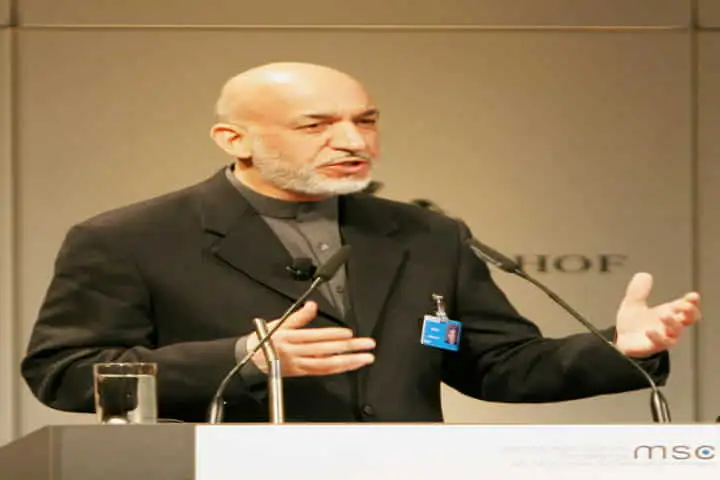As fighting between the resistance front mounted from the Panjshir valley and the Taliban rages on, former Afghan President Hamid Karzai, assuming the role of elder-statesman, is appealing for a negotiated end to the conflict.
Karzai said on Twitter: "I hope that the parties will resolve the current issue through dialogue so that our long-suffering people can enjoy peace and be happy."
Karzai and former Vice President Abdullah Abdullah, an ethnic Tajik are ideally positioned to mediate between the Panjshiri resistance.
The former President stressed that war was not a solution because it only brought suffering to the country.
Karzai’s appeal is all the more pressing as the battles in Panjshir are leading to heavy casualties—a situation which dampens the sentiment for dialogue, and threatens Civil War in a country that has had more than its share of blood-letting.
On Sunday, Afghanistan’s Northern Resistance Front chief Ahmad Massoud tweeted that the resistance forces had killed over 700 Taliban fighters and captured 600 while the others were on the run from the Panjshir battlefront.
“More than 700 of them (Taliban) were killed, 600 captured and prisoned, the rest are trying to escape, we are in the Frontline, everything was planned. We control the whole province,” Massoud tweeted.
The resistance forces' spokesperson Fahim Dashti also tweeted about the heavy casualties inflicted on the enemy. He said that the Taliban had problems with getting supplies from other Afghan provinces, India Narrative reported earlier.
Also Read: 700 Taliban fighters killed, 600 captured in fierce Panjshir battle, claims Massoud
There have been at least two rounds of dialogue between the Panjshiri resistance and the Taliban, but the gap, so far is too wide to bridge. The Taliban is demanding Panjshiri capitulation on the battlefront as a precondition for dialogue and possible reconciliation. On the contrary, the resistance is demanding a Taliban commitment for an inclusive government, that will protect basic civil rights of all, including women for a dialogue to progress.
Massoud’s forces are likely to be emboldened by the prospects on infighting between, what appears to be a faction-ridden Taliban. On Saturday, Pakistan ISI chief Faiz Hameed landed in Kabul to bring to an end intra-Taliban infighting, which could yield the formation of a new government.
According to Pakistani media, ISI chief Faiz has reached Kabul on the invitation of the Taliban Shura to discuss the future of Pakistan and Taliban security and economic ties.
Pakistani ISI Chief Faiz Hameed just arrived in Kabul Serena Hotel. Told me he was here to meet Pakistani Ambassador – wouldn’t say he was meeting Taliban leadership (but he must be of course!) pic.twitter.com/afhfpNqzw8
— Lindsey Hilsum (@lindseyhilsum) September 4, 2021
Though the Taliban spokespersons have been saying that the decision on the Taliban cabinet has been approved by the Taliban chief but the group has yet to form a government.
There are serious differences among the various different factions mainly between the “original” team of the Taliban and leaders of Haqqani network.
One the one side is Mullah Baradar, the co-founder of the Taliban group and an old associate of founder Mullah Omar and Mullah Yakub, the son of Mullah Omar who thinks that he is the natural “heir” of the group. The other faction arrayed against them is Sirajuudin Haqqani, son of Jallauddin Haqqani, the founder of the powerful Haqqani network. Sirajuddin is supported by his younger brother Anas and uncle Khalil-ur-Haqqani.
The main friction is between Mullah Yakub, son of the Taliban founder Mullah Omar who thinks that he is the rightful heir to his father’s legacy and Sirajuddin Haqqani the heir of Haqqani network and the most powerful militant commander in Afghanistan.
As head of the notorious Haqqani network, the territory now under the control of his fighters includes Kabul and the northern city of Mazar-e-Sharif, in addition to key border crossings into north-western Pakistan, Uzbekistan, and Tajikistan.
Sanctioned by the United States as an international drug trafficker and an officially designated terrorist leader, Sirajuddin Haqqani is purported to have the Taliban's strongest ties to both the Al-Qaeda terrorist network and Pakistan's Inter-Services Intelligence (ISI) agency. His brother Anas and uncle Khalil-ur- Rahman Haqqani played key roles in the fall of Kabul.
Also Read: Pak ISI chief in Kabul to sort out fight between Taliban and Haqqani groups over govt posts




















